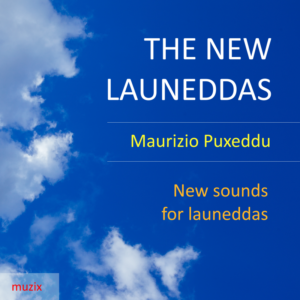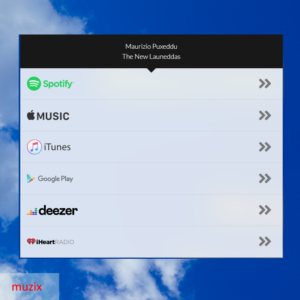THE NEW LAUNEDDAS
Starting from the analysis of the peculiarities that most distinguish the launeddas, but considering this instrument as any other musical instrument of cultured extraction (with which in the past certain exploratory paths have already been completed), Maurizio Puxeddu for years has dedicated himself to experimentation and music research for new and unprecedented possibilities for using launeddas.
Listen and download with Spotify and others musical platforms >
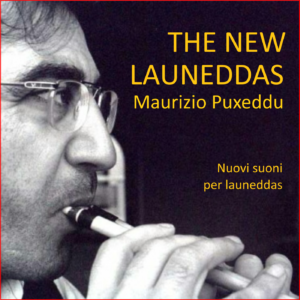
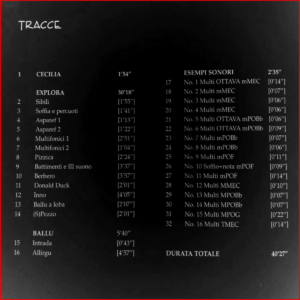
THE NEW LAUNEDDAS Nuovi suoni per launeddas
Versione digitale – Copyright © Maurizio Puxeddu (1999)
In the catalog of sounds, THE NEW LAUNEDDAS – New sounds for launeddas, offers us a phase of his musical journey. His musical works seek the use of the island instrument to say things never said; ventures into sound areas never explored by the instrument, makes them his own by projecting the listener into an incredible varied and multicolored world of blown, beaten, aspirated, pinched, multiphonic, hinted sounds …
Maurizio Puxeddu explored, dug, went into the island instrument, squeezed, crushed, comminuted it. His idea is to be able to use launeddas in artistic contexts unrelated to tradition. So let’s not expect only traditional sounds from his launeddas.
We listen without prejudice to his poetics of the other sound that accompanies us between the delicate hissed and blown sounds and the intrusive and aggressive sounds of the stone-sounds. While loving him, the artist gets rid of the mythical traditional sound. It shows us how you can also play with launeddas: listening to Donald Duck it’s impossible not to smile hearing Donald Duck’s voice modulated through the launeddas.
BUY the book + CD + digital audio tracks
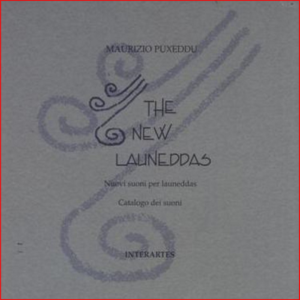
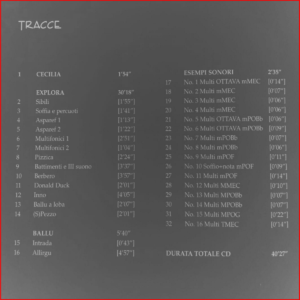
THE NEW LAUNEDDAS Nuovi suoni per launeddas
Book: Catalogo dei suoni + CD Allegato (omaggio) / Lingua: Italiano, Inglese
Copyright © Maurizio Puxeddu (1999)
THE NEW LAUNEDDAS – The project
The initiative was conceived for the urgent need to bring to the knowledge of a large audience the result of a long research and experimentation, absolutely original and innovative, carried out by Maurizio Puxeddu, relating to the new and unprecedented possibilities of use, both musical constructive, launeddas.
Maurizio Puxeddu dedicated himself to experimentation and research with the launeddas starting from the analysis of the peculiarities that distinguish them but considering them as any other musical instrument of cultured extraction with which in the past certain exploratory paths have already been completed. From this research, a multitude of additional sound possibilities have sprung up, in addition to the formidable ones found in tradition, which project this multi-millennial instrument into paths that are never open. Maurizio Puxeddu explored, dug, went into the tool, squeezed, crushed, comminuted it.
His idea is to be able to use launeddas even in artistic contexts unrelated to tradition.
With the contribution and in collaboration with:
Regione Autonoma della Sardegna
Comune di Cagliari
Conservatorio di Musica di Cagliari “G.P. da Palestrina”
EXMA’
I.S.O.L.A.
UNITRE ORISTANO
CONSORZIO PER LA PUBBLICA LETTURA “S.Satta”
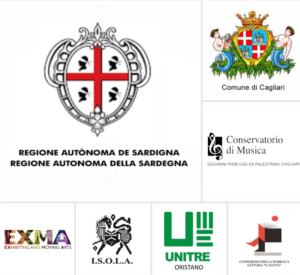
In 1990, he used the launeddas in the soundtrack for the theatrical show “Sa Matta”, taken from a text by Antonio Garau (directed by Enzo Parodo – production of Teatro Studio), and subsequently began to modify the instrument so that it could produce other notes besides traditional ones.
In 1992, for the theatrical show in Sardinian language “Lintu e pintu” with Mario Medas (directed by Gianluca Medas – production of Sons of Art Medas), where a melancholy musical atmosphere was needed which was realized through the sound of a punt’e organu modified in its construction, or lowering the third and seventh degrees of the scale by a semitone. So the launeddas, which in the tradition always play in “major”, played in “minor”. Another contribution of his towards a different use of launeddas can be heard in two audio tracks by the Sardinian singer-songwriter Piero Marras taken from the CD “TUMBU”: “B’at una femina” and in “Sa ‘oghe’ e Maria”, a song dedicated to the figure of Maria Carta.
Continuing on this exploratory path, he has continued over the years to experiment and research the production of numerous unusual sounds for the island instrument, a job that then grew to develop into the THE NEW LAUNEDDAS project.
NUORO
CONFERENZA – THE NEW LAUNEDDAS
Mercoledì 15 dicembre 1999
Collaborazione: Consorzio per la Pubblica Lettura “S.Satta
Spazio: Auditorium Biblioteca “S.Satta”, p.zza Asproni 8
Relatori ed argomenti:
Francesco Pintore – Rapporti tra mercato e musica etnica
Giacomo Serreli – Contaminazioni musicali in Sardegna
Maurizio Puxeddu – The new launeddas – Nuovi suoni per launeddas
SASSARI
CONFERENZA – THE NEW LAUNEDDAS
Giovedì 16 dicembre 1999
Collaborazione: I.S.O.L.A.
Spazio: Padiglione dell’artigianato c/o Bottega ISOLA, viale Mancini
Relatori ed argomenti:
Alberto Sanna – Da strumento popolare a strumento colto
Leonardo Sole – La musica delle parole
Maurizio Puxeddu – The new launeddas – Nuovi suoni per launeddas
ORISTANO
CONFERENZA – THE NEW LAUNEDDAS
Venerdì 17 dicembre 1999
Collaborazione: UNITRE
Spazio: Sala conferenze UNITRE, via XX Settembre 14
Relatori ed argomenti:
Maria Dolores Picciau – Contaminazioni e identità
Antonio Trudu – Tecniche nuove per strumenti antichi
Maurizio Puxeddu – The new launeddas – Nuovi suoni per launeddas
CAGLIARI
SEMINARIO – NUOVI SUONI PER LAUNEDDAS
Martedì 21 e mercoledì 22 dicembre 1999
Orari: dalle 10.30 alle 12.30 e dalle 16.30 alle 18.30,
Collaborazione: Conservatorio di Musica “P.L. da Palestrina” di Cagliari
Spazio: Aula Magna del Conservatorio
Docente: Maurizio Puxeddu
Maestro collaboratore: Adriano Orrù
CAGLIARI
MOSTRA – INVENZIONI SONORE
28-29-30-31 dicembre 1999
Collaborazione: EXMA’
Spazio: Sala della Torretta dell’EXMA’
Artisti:
Maria Grazia Oppo – Installazione
Maurizio Puxeddu – Sculture sonore, strumenti innovativi, progetti e prototipi per nuove launeddas
Testo critico di Maria Dolores Picciau
Allestimento: Mario Olivieri

